|
I have been using Trijicon’s
ACOG scopes for several years now. ACOG stands for Advanced
Combat Optical Gunsight, but ACOG could also be an acronym
for America’s Combat Optical Gunsight. Living within
thirty miles of Fort Campbell, Kentucky, I know many soldiers in
the 101st Airborne Division, and a few in the 5th
Special Forces group. It is pretty well known that the ACOG is
in use by many special fighting units in Afghanistan and Iraq,
but there are other optical sights in use there as well.
However, soldiers tell me that the ACOG is the one that everyone
wants. I also often get inquiries from other military units
wanting contact info to purchase ACOGs themselves, without
waiting for approval from the suits in DC. My son-in-law has
done three tours over there in the sandbox. Not being an officer
or senior NCO, he was issued an Aimpoint, but he said
that every soldier in his unit that could, traded their
Aimpoints for ACOGs. In my opinion, and many others who know
better than I agree, the ACOG offers so many advantages in a
combat situation that it is just superior to anything else
currently available. One very important feature of the ACOG is
that it uses no batteries. Unlike many designs, it never needs
batteries, and is always “on”. The middle of a firefight is
no place to have a battery failure. With the ACOG, that is never
a problem. The reticle is lighted at night or in a dark building
or cave by a tritium module that is guaranteed for fifteen years
to light the reticle. In bright daylight most ACOGs also have a
fiber-optic rod that lights the reticle according to available
light conditions. This feature self-adjusts, getting brighter as
conditions warrant, but dimming for low-light conditions. A
reticle that is too bright will blind the user from seeing
through the scope, preventing him from seeing the target
clearly, if at all. Since the ACOG self-adjusts, the soldier
never has to worry about setting the brightness to match the
light, or lack thereof. Perfect.
The Bindon Aiming Concept of the ACOG
reticle allows the shooter to keep both eyes open at all times,
even though the ACOG has magnification that varies from 3.5 to
5.5 power, depending upon the model selected. I was very
skeptical of this when I first heard of it, but it works. When
swinging the rifle searching an area, the weak eye takes over,
allowing for a wide field of view. When the reticle settles upon
a target, the eye looking through the scope naturally takes
over, due to the magnification.
ACOG scopes are available in many variations,
with different reticle colors and styles. I like the very
compact size of the smaller ones, but that 5.5 power model has
such superb optical clarity, that the tradeoff in size is worth
it. I have used one of those on an AR-10 chambered for the .308
Winchester successfully on targets out to 1094 yards (1000
meters for you metric folks). I once believed that much more
power is needed to shoot accurately at that distance, but the
5.5 power ACOG handled it beautifully, and the reticle on that
scope is marked out to 1200 meters.
The ACOGs are tough, built with a heavy duty
housing, the size is kept compact through the use of prisms. The
objective lenses are recessed for better protection, and the
scopes have plenty of eye relief. These things are built to take
the punishment given by fighting soldiers. They are dropped,
neglected, drenched, and battered, but hold up very well. They
are waterproof to a depth of 100 feet. The adjustment turrets
are low and well protected. I won’t go into great detail here
about each ACOG, instead I refer you to my previous reviews of
various ACOG models (ACOG &
Reflex Sight; ACOG
with Docter Optic; ACOG
5.5x50mm). All ACOGs will mount on an AR carry handle,
and all can use the flattop adapter for mounting atop a
Picatinny rail. With an ACOG on the carry handle, the standard
AR sights can still be used if needed, without removing the
scope. Also, the handle can still be used to carry the weapon.
I have ACOG scopes with a variety of reticles. I
made a somewhat inept attempt to take pictures of some of them,
and you can view them here, but the reticles on ACOGs that I
personally have are better illustrated below:
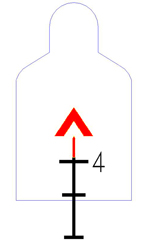

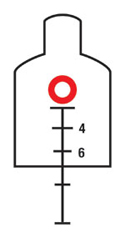
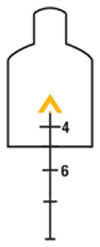
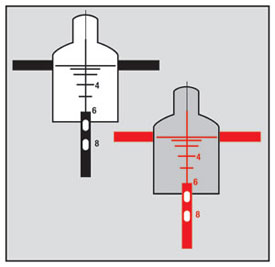
There are a few other styles, colors, and
options available in the reticle choices, and you can get them
calibrated for either 5.56mm or 7.62mm NATO cartridges. I am
glad that our military is purchasing these for our soldiers.
When we send them off to fight for us, they deserve nothing less
than the best equipment available. With the large budgets of
some of our elite fighting units, they can buy the best scope
available. They buy the ACOG.
For a look at the extensive line of ACOG scopes
and other Trijicon products, go to www.trijicon.com.
Jeff Quinn
  
Got something to say about this article? Want to agree (or
disagree) with it? Click the following link to go to the GUNBlast Feedback Page.
|
|
Click pictures for a larger version.
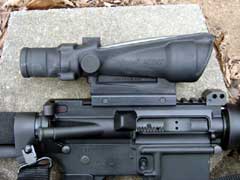
Trijicon's ACOG: America's Fighting Scope.
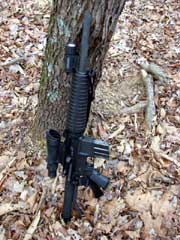
ACOGs are compact, reliable and rugged.
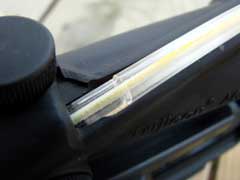
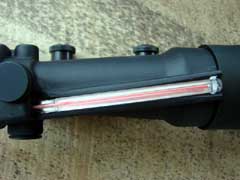
Fiber optic lights reticle in daylight conditions.
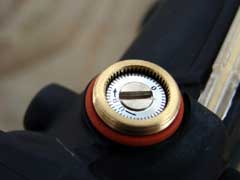
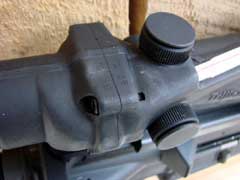
Adjustments are reliable and well protected.
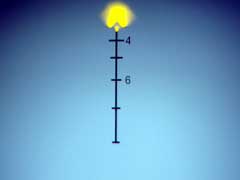
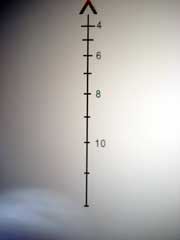
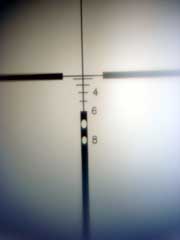
Author's feeble attempts at photographing the reticles
do not do justice to the ACOGs' clarity.
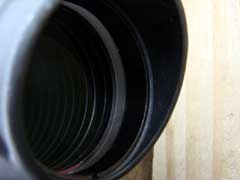
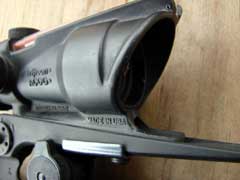
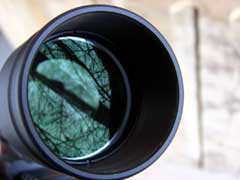
Lenses are solidly mounted and well protected from
damage and glare.
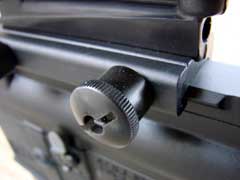
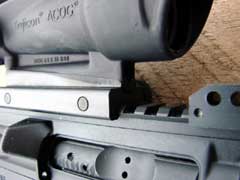
Flattop mount allows mounting to Picatinny rails.
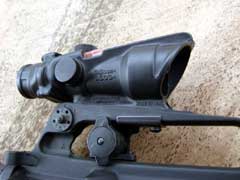
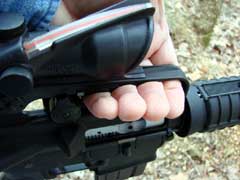
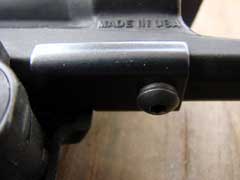
Handle mount allows use of iron sights, and retains the
handle's intended function.
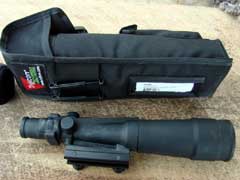
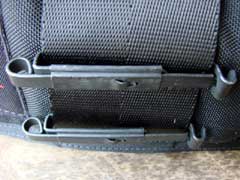
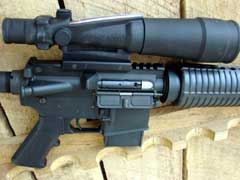
5.5 power ACOG.
|
![]()